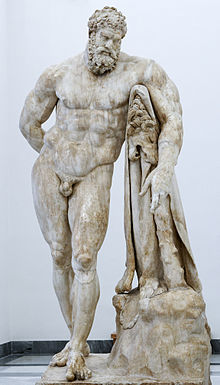ความเป็นชาย

ความเป็นชาย (อังกฤษ: masculinity) คือ คุณสมบัติ พฤติกรรมและบทบาทที่เกี่ยวข้องกับเด็กผู้ชายและผู้ชาย โดยสังคมเป็นผู้กำหนดต่างจากความหมายของเพศชาย[1][2] มาตร่ฐานต่างกันไปตามวัฒนธรรมและยุคสมัย[3] ทั้งเพศชายและเพศหญิงสามารถแสดงออกลักษณะและพฤติกรรมของผู้ชายได้[4]
ลัษณะที่แสดงถึงความเป็นชายในสังคมตะวันตกได้แก่ ความกล้าหาญ พึงพาตนเอง ความรุนแรง และการกล้าแสดงออก[5][6][7][8] ความเป็นลูกผู้ชาย(Machismo)เป็นรูปแบบหนึ่งของความเป็นชายที่เน้นพลังอำนาจและความเป็นชายโดยไม่คำนึงถึงผลกระทบและหน้าที่[9]
อ้างอิง[แก้]
- ↑ Ferrante, Joan (2008), "Gender and sexualities: with emphasis on gender ideals", in Ferrante, Joan (บ.ก.). Sociology: a global perspective (7th ed.). Belmont, California: Thomson Wadsworth. pp. 269–272. ISBN 9780840032041.
- ↑ "Gender, Women and Health: What do we mean by "sex" and "gender"?". who.int. World Health Organization. คลังข้อมูลเก่าเก็บจากแหล่งเดิมเมื่อ 8 September 2014. สืบค้นเมื่อ 17 September 2014.
- ↑ Kimmel, Michael S.; Aronson, Amy, บ.ก. (2004). Men and Masculinities: A Social, Cultural, and Historical Encyclopedia, Volume 1. Santa Barbara, Calif.: ABC-CLIO. p. xxiii. ISBN 978-1-57-607774-0.
- ↑ Halberstam, Judith (2004). "'Female masculinity'". ใน Kimmel, Michael S.; Aronson, Amy (บ.ก.). Men and Masculinities: A Social, Cultural, and Historical Encyclopedia, Volume 1. Santa Barbara, Calif.: ABC-CLIO. pp. 294–5. ISBN 978-1-57-607774-0.
- ↑ Kimmel, Michael S. (1994). Theorizing Masculinities. Thousand Oaks: SAGE Publications, Inc. pp. 119–141.
- ↑ Vetterling-Braggin, Mary (1982). "Introduction". "Femininity", "masculinity", and "androgyny": a modern philosophical discussion. Totowa, N.J: Littlefield, Adams. p. 6. ISBN 9780822603993.
the [personality] theorist might classify a person as "masculine" if the person thought that person to have any or all of the following P-traits [personality traits] - GROUP Y TRAITS: strength of will, ambition, courage, independence, assertiveness, aggressiveness, ...
- ↑ Carli, Linda L. (2001). "Assertiveness". ใน Worell, Judith (บ.ก.). Encyclopedia of women and gender: sex similarities and differences and the impact of society on gender, Volume 1. San Diego, California: Academic Press. pp. 157–168. ISBN 9780122272462.
- ↑ Thomas, R. Murray (2001), "Feminist perspectives", in Thomas, R. Murray (บ.ก.). Recent theories of human development. Thousand Oaks, California: Sage. p. 248. ISBN 9780761922476.
Gender feminists also consider traditional feminine traits (gentleness, modesty, humility, sacrifice, supportiveness, empathy, compassion, tenderness, nurturance, intuitiveness, sensitivity, unselfishness) morally superior to the traditional masculine traits (courage, strong will, ambition, independence, assertiveness, initiative, rationality and emotional control).
- ↑ "Machismo (exaggerated masculinity) - Encyclopædia Britannica" (online ed.). Encyclopædia Britannica, Inc. สืบค้นเมื่อ 6 March 2015.
